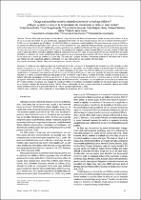Por favor, use este identificador para citar o enlazar este ítem:
https://repositorio.usj.es/handle/123456789/339
| Título : | Do age and sex influence on functional movement in school-age children? |
| Autor: | García-Pinillos, Felipe



Párraga-Montilla, Juan A. 

Roche-Seruendo, Luis Enrique 


Delgado-Floody, Pedro 

Martínez-Salazar, Cristian 

Latorre-Roman, Pedro A. 
|
| Palabras clave : | Assessment; Children; Functional movement screen; Gender; Maturation |
| Fecha de publicación: | 2019 |
| Editorial : | FEDERACIÓN ESPAÑOLA ASOC DOCENTES EDUCACIÓN FÍSICA-FEADEF, C CABO VIDIO 27, SAN JAVIER, MURCIA, 30730, SPAIN |
| Resumen : | El objetivo de este estudio fue determinar la influencia de la edad y el sexo en la funcionalidad del movimiento de niños españoles en edad escolar. Un grupo de 172, 6-11 años (83 niñas y 89 niños), participaron en este estudio. Las variables medidas en el estudio fueron el rendimiento en el Functional Movement ScreenTM (FMS), el sexo y la edad cronológica de los niños. Un ANCOVA (BMI como covariable) reveló diferencias significativas en la puntuación total obtenida en el FMS entre grupos de edad (p=0.003) pero no entre sexos (pe»0.05). En cuanto a los tests individuales incluidos en la batería, se hallaron diferencias entre grupos de edad en el test de lunge en línea y movilidad de hombro; mientras en relación al sexo, se hallaron diferencias significativas (p<0.05) se encontraron en el lunge en línea (en el grupo sub-10 años) y en el test de push-up (sub-12). El análisis de regresión lineal señaló al BMI como el principal predictor del rendimiento en FMS en escolares, con una significativa contribución de la variable edad (R2 = 0.206, p<0.001), y la variable sexo excluida del modelo (p=0.097). En conclusión, los resultados reportados en este estudio sugieren que la edad es un predictor moderado del rendimiento total en FMS en niños en edad escolar, el sexo no parece determinar el rendimiento, mientras que el BMI resulta predictor primario de la puntuación total en el FMS en escolares españoles (6-11 años). Palabras clave: evaluación; niños; evaluación de funcionalidad de movimiento; género; maduración |
| Descripción : | The aim of this study was to determine the influence of age and sex on the functional movement in Spanish primary school children. A group of 172, 6–11 years old children (83 girls and 89 boys), participated in this study. The main outcome measures were the Functional Movement ScreenTM (FMS), sex and chronological age of children. The ANCOVA (BMI as a covariate) revealed significant differences between age groups (p=0.003) but no between-sex differences (pe»0.05) in FMS total score. As for individual FMS tests, significant differences between age groups (p<0.05) were found in the in-line lunge and the shoulder mobility tests; whereas, according to sex, significant differences (p<0.05) were found in the in-line lunge test (under 10 years old group) and the push-up test (under 12 group). The stepwise linear regression analysis revealed BMI as a primary predictor of FMS total score in school age children, but with a significant additional contribution from age (R2 = 0.206, p<0.001), whereas the sex was excluded from this model (p=0.097). In conclusion, the results reported in this study suggest that age is a moderate determinant of FMS scores, whereas sex is not a determinant in this battery test in school age children (6-11 years old). This study also highlights that BMI is the primary predictor of FMS total score in school age children, but with a significant additional contribution from age, whereas the sex was excluded from this model. |
| URI : | https://repositorio.usj.es/handle/123456789/339 |
| ISSN : | 1579-1726 |
| Aparece en las colecciones: | Artículos de revistas |
Ficheros en este ítem:
| Fichero | Descripción | Tamaño | Formato | |
|---|---|---|---|---|
| 63256-205988-1-PB.pdf | 59,9 kB | Adobe PDF |  Visualizar/Abrir |
Este ítem está sujeto a una licencia Creative Commons Licencia Creative Commons

